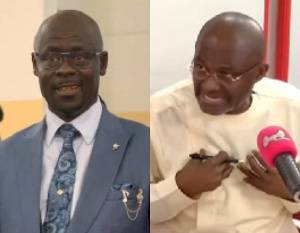In the ever-evolving landscape of politics, alliances and partnerships play a crucial role in shaping the future of a nation. Ghana's political sphere has recently been abuzz with talks of a potential collaboration between two prominent figures, Vice President Dr. Mahamudu Bawumia and the outspoken Member of Parliament, Kennedy Agyapong. In a recent interview with Yaw Baafi, a seasoned political analyst and strategist, he expressed his optimism about the possibility of Bawumia incorporating Agyapong into his team with relative ease. This article delves into the reasons behind Baafi's views, the potential impact of such an alliance, and the broader implications for Ghanaian politics.
A Background on Bawumia and Agyapong:
Dr. Mahamudu Bawumia, the current Vice President of Ghana, is a highly esteemed economist with a distinguished track record. He has been a key figure in the New Patriotic Party (NPP), advocating for fiscal discipline and economic reforms. Bawumia's academic background and technocratic approach to politics have earned him respect across party lines.
On the other hand, Kennedy Agyapong, an astute businessman, and member of the NPP, is well-known for his fiery and controversial remarks. As a seasoned legislator, Agyapong has been a vocal advocate for the interests of his constituents and a staunch supporter of the NPP.
Baafi's Perspective:
In the interview, Yaw Baafi articulated several reasons why he believes Bawumia could seamlessly integrate Agyapong into his team:
1. Complementary Skills: Both Bawumia and Agyapong bring diverse skill sets to the table. While Bawumia is renowned for his expertise in economics and governance, Agyapong's grassroots experience and tenacity in public discourse can offer a fresh perspective in decision-making processes.
2. Bridging the Gap: Agyapong's assertive personality and candid approach to addressing issues can appeal to a different demographic, potentially bridging the gap between the government and citizens who seek a more straightforward representation.
3. Regional Influence: Kennedy Agyapong's strong influence in the Ashanti region, a political stronghold in Ghana, could prove invaluable in consolidating support for the NPP and the government's policies.
4. Unity within the NPP: Bawumia's move to incorporate Agyapong into his team could foster a sense of unity within the NPP, further solidifying their position and preparations for future elections.
The Impact of the Alliance:
If Vice President Bawumia successfully brings Kennedy Agyapong on board, it could have significant implications for Ghanaian politics. The combination of Bawumia's steady, technocratic approach, and Agyapong's charisma and grassroots appeal might enhance the NPP's popularity and enable them to reach a broader voter base.
Moreover, such an alliance could potentially stimulate productive discussions within the government, with diverse viewpoints leading to more informed policy decisions. The public, too, would benefit from hearing different perspectives on crucial matters that affect their daily lives.
In conclusion, as the prospect of a collaboration between Vice President Bawumia and Kennedy Agyapong gains traction, political enthusiasts in Ghana eagerly await the unfolding developments. Yaw Baafi's positive outlook on the matter highlights the potential benefits of such a partnership. Nevertheless, only time will reveal the true impact of this alliance on the NPP, the government, and Ghana as a whole.
In the dynamic world of politics, unexpected alliances can shape the future of a nation and present exciting possibilities. Regardless of the outcome, it is crucial for Ghanaian leaders to prioritize unity, progress, and the well-being of their citizens above all else.




No comments yet
Be the first to share your thoughts!